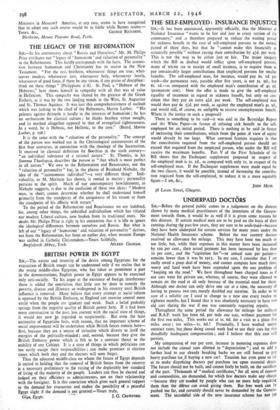BRITISH POWER IN EGYPT
SIR,—The extent and intensity of the desire among Egyptians for the evacuation of British troops can be understood only if we realise that to the young middle-class Egyptian, who has taken so prominent a part in the demonstrations, English power in Egypt appears to be exercised only anti-socially. To his anger at the existence of foreign interference there is added the conviction that little can be done to remedy the poverty, disease and illiteracy so• widespread in his country until British influence is removed. Many believe that every attempt at social reform is opposed by the British Embassy, as England can exercise control more easily when the people are ignorant and weak. Such a belief probably springs from the negative quality of British power here. If it had been more constructive in the past, less content with the social state of things, it would not now ke regarded so suspiciously. But even the least nationalist of Egyptians feels, with reason, that no important scheme of social improvement will be undertaken while British forces remain here— first, because they are a source of irritation which diverts to itself the energies of the politically-minded ; and, second, because they give the British Embassy power which is felt to be a constant threat to the stability of any Cabinet. It is a state of things in which politicians can too easily escape their responsibilities ; can make promises at election times which both they and the electors will soon forget.
Thus the educated middle-class on whom the future of Egypt depends is united in holding that the removal of British forces from the country is a necessary preliminary to the raising of the deplorably low standard of living of the majority of the'people. Leaders can then be elected and judged on their efficiency as administrators, not on their relationship with the foreigner. It is this conviction which gives such general support io the demand for evacuation and makes the possibility of a peaceful Egypt slight if the demand is not granted.—Yours truly,
0






























 Previous page
Previous page